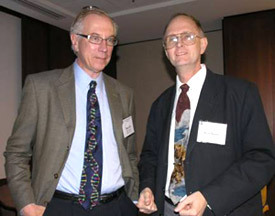Contact Information: Media Contact Ms. Amy Nelson Tel: + 1 360 685 5478
Support for Younger Researchers and High-Risk Research Is Critical, Says Blue-Ribbon Panel
SPIE Leadership Underscores Importance of Needs
| Source: SPIE
BELLINGHAM, WA--(Marketwire - June 6, 2008) - Programs and policies that support
early-career investigators and high-risk, high-reward research are needed
in order to preserve U.S. leadership in science and technology, contends a
report released yesterday by the American Academy of Arts and Sciences.
The report, "ARISE: Advancing Research In Science and Engineering,"
documents a lack of financial support for potentially transformative
science and technology research, and risk-averse thinking and policies that
stifle important new research directions. The blue-ribbon committee that
produced the report was chaired by Thomas Cech, president of the Howard
Hughes Medical Institute and winner of the 1987 Nobel Prize in chemistry.
"The ARISE report highlights a very key issue regarding fostering new
research," said SPIE President Kevin Harding. "As Thomas Cech himself has
pointed out, he received his Nobel Prize for work he did in his early
30s. Albert Einstein published his special theory of relativity when he was
just 26 years old. It is the new ideas, now concepts that have led to the
revolutionary advances in science, often done by people in the early years
of their careers.
"SPIE is trying to do its part for early career professionals through our
grant programs, special conference activities for early career
professionals, and a new award in the area. But there needs to be much more
done by both industry and government to grow new research. As the report
points out, we may need to rethink how research monies are allocated to be
sure we are not overlooking those new ideas essential to a healthy and
competitive technology base by only funding the low risk efforts that
provide the useful, but incremental, near term advances."
As an example, the report notes that the average age for first-time
recipients of primary research grants from the National Institutes of
Health is 42.4 and rising, and that the success rate for first-time grant
applicants has declined from 86 percent in 1980 to 28 percent in 2007.
Cech drew a direct connection between federal research funding reductions
and the rising age of grant recipients. Younger scientists starting their
own laboratories are competing for research money with more senior
scientists with established labs and a history of productivity. The younger
researchers are relegated to spending time seeking grants rather than
participating in what could be a very creative career phase, Cech said in
an interview with the Financial Times.
While current funding is a result of existing administration policies,
"there is totally inadequate attention being paid to the problem in the
current presidential election cycle," said Eugene Arthurs, CEO of SPIE.
"It's just like Nero fiddling while Rome burns."
Read more about the report at http://www.amacad.org/news/newArise.aspx.
About SPIE
SPIE is an international optics and photonics society founded in 1955
advancing light-based technologies. Serving the interests of its more than
188,000 active constituents representing 138 different countries, SPIE acts
as a catalyst for collaboration among technical disciplines for information
exchange, continuing education, publishing opportunities, patent precedent,
and career and professional growth. As the organizer and sponsor of
approximately 25 major conferences and education programs annually in North
America, Europe, Asia, and the South Pacific, SPIE provides publishing,
speaking, and learning opportunities on emerging technologies. For more
information, visit http://SPIE.org.
